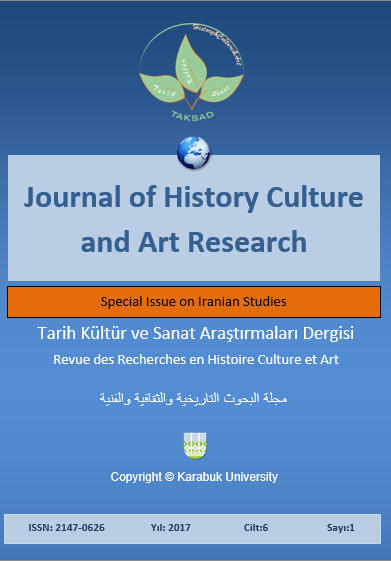Assessment of Social Capital in terms of Participation, Knowledge, Trust, and Social Cohesion: Zahedan Case Study
DOI:
https://doi.org/10.7596/taksad.v6i1.773Keywords:
Social capital, Knowledge, Trust, Participation, Social cohesion, Zahedan.Abstract
It is anticipated that the urban population in developing countries increases more than double from 2000 to 2030. This rapid population transformation to cities will be difficult. Therefore, the municipal administration will be involved in numerous challenges in cities. For this purpose, social capital as a bottom-up planning is one of the appropriate ways of management and dealing with these challenges. The aim of this study was to measure the social capital in four aspects of knowledge, participation, social cohesion, and trust in Zahedan. The research method of this research is descriptive-analytic in an applied type. Library studies and surveying (questionnaire) were used to collect the required data. The questions in this survey were designed based on four indicators of social capital. The statistical population of the present study is 575,116 people residing in Zahedan in 2011. One sample T- test was used for calculations. The results of the analysis show that the social capital criteria in the city of Zahedan are undesirable in all four criteria.
References
Abdollahi, Mohammad & Mirtaher, Mousavi (2007). Social Capital in Iran; The Current Situation, Future Prospects and the Possibility of Transition, Journal of Social Welfare, Vol. 6, Issue 25, 2007.
Alavitabar, Alireza (2000). The Pattern of Citizen Participation in City Affairs (Global Experiences and Iran). The Municipalities.
Alizadeh, Hadi; Morteza, Nemati, & Rezaei Jafari, Kamran (2015). Analysis of the Good Urban Governance Using Fuzzy Hierarchical Analysis, Urban and Regional Studies and Research. Sixth year, No. 24.
Alvani, Seyed Mahdi & Danaeifard, Hassan (2001). Governmental Administration and Public Trust, Knowledge of Management, No. 55.
Barghamadi, Hadi (2008). Effects of Diaspora Neighborhood Destruction on the Social Capital of Khak Sefid Neighborhood. Journal of Social Welfare. No. 28, the seventh year, Tehran University of Rehabilitation and Welfare.
Biero, Allen (1991). Social Sciences Culture, Translated by Baqer Sarookhani, Tehran: Keyhan Publications.
Coleman, James (1998). Foundations of Social Theory. Translated by Sabouri. Tehran: Ney Publications.
Ebrahimzadeh, Issa & Asadi, Morteza (2012). Analysis and Evaluation of the Implementation of Urban Good Governance in Iran (Case Study: Kashmar). geography and urban-regional planning, No. 6, pp. 30-17.
Ebrahimzadeh, Issa (1998). Participative Management of Councils and Rural Management System in Iran, Journal of Humanities and Social Sciences Research Institute (SID). publishing (SID). The second issue.
Ebrahimzadeh, Issa; Barimani, Faramarz & Nasiri, Yusef (2004). Suburbanization and urban anomalies and its modification strategies, Journal of Geography and Development Sistan and Baluchestan University, Second year, No. 3.
Firouzabadi, Seyed Ahmad (2005). Social Capital and Factors Affecting its Formation in Tehran. Faculty of Social Sciences of Tehran University PhD dissertation.
Fukuyama, Francis (2000). End of the Order, Social Capital and Maintain it. Translated by Gholam Abbas Tavasoli, Tehran: Jamea Iranian Publications.
Fukuyama, Francis (2005). Civil Society and Social Capital, Social Capital: Trust, Democracy and Development (Collected by Kian Tajbakhsh), Tehran: Shirazeh publication.
Hajipour, Khalil (2006). Neighborhood Planning - Effective Approach in The Development of Sustainable Urban Management, College of Fine Arts, Issue 26, Summer, Tehran University.
Karkonan, Mohsen (2009). Proceedings of the National Conference on Culture and Development in the Central Region of Iran.
Latifi, Gholareza & Azimi, Mitra (2010). Social Capital and its Role in Planning and Urban Management, Specialized Monthly Notification, Review Book, No. 32, fourteenth year.
MehdiZadeh, Javad (2006). Strategic Planning of Urban Development, Ministry of Housing and Urban Development.
PourMohammadi, Mohammad Reza; Hosseinzadeh, Dalir & Karim Piri, Issa (2011). An Analysis of the Qualitative Change in the Social Capital of East Azarbaijan Province, Geographical Studies Arid Regions, The First Year, No. 3, pp. 19.
Putnam, Robert (2001). Democracy and Civil Traditions. Translated By Delafrouz, Muhammad Taqi. Tehran: Political Studies Office of the Interior Ministry.
Rezaei, Mohammad Reza & Soudeh Negin, Naji (2015). Evaluating the Effective Strategies to Create Sustainable Communities with Participatory Approach (Case Study: Rahnamaei neighborhood of Yasouj). Research and Urban Planning Magazine, No. 20.
Saeedi Rezvani, Navid & Kazemian, Gholamreza (2001). The Feasibility of Assigning New Tasks to the Municipalities, The First Edition (Theoretical Developments and Global Experiences). Municipalities Nations Publication.
Sarookhani, Baqer (1991). Introduction to the Encyclopedia of Social Sciences. Tehran: Kayhan publication.
Tajbakhsh, Kian (2005). Social Capital: Trust, Democracy and Development. Translated by Afshin Khakbaz and Hassan Pouyan, Tehran, Shirazeh Publications.
Tavakoli, Morteza & Tajbakhsh, Kazem (2008). Analyzing the Social Capital of Sistan Border in Urban and Rural Areas, Journal of village and Development, Vol. 11, No. 2, pp. 143.
Downloads
Published
How to Cite
Issue
Section
License
All papers licensed under Creative Commons 4.0 CC-BY.- Share — copy and redistribute the material in any medium or format
- Adapt — remix, transform, and build upon the material for any purpose, even commercially.
Under the following terms:
Attribution — You must give appropriate credit, provide a link to the license, and indicate if changes were made. You may do so in any reasonable manner, but not in any way that suggests the licensor endorses you or your use.
- No additional restrictions — You may not apply legal terms or technological measures that legally restrict others from doing anything the license permits.







